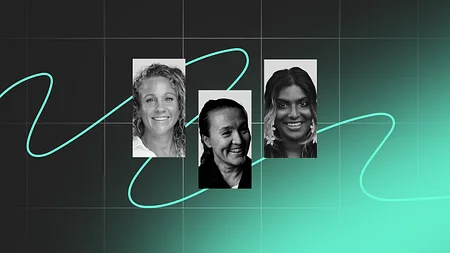Making financial services better, faster, stronger

We knew we had to pull out all the stops for the first IRL After Dark since records began. Well, March 2020.
So that’s exactly what we did. The setting was London’s CodeNode and online. Our expert panel put financial services in 2021 to the sword and set improvement goals for next year and beyond - what to stop, start and improve.
They were Simon Taylor, Jason Bates, Chief Digital Officer at Lloyd’s and AD veteran Louise Smith and EMEA Business Lead at Stripe Matt Henderson, making his debut.
Here’s what went down. And check out the recording here.
Putting FS in 2021 through its paces
Simon kicks things off with a simple request - rate the industry this year out of 10. Early polling shows a pretty comprehensive 7-8. Jason chimes in: ‘On the one hand, you’ve got the big incumbents. Have they been pushing innovation recently? No. Have they kept the lights on? Yes’. Not to be sniffed at, all things considered. Indeed, Jason. They get an 8.
Louise is next in the hot seat. Does she agree with our audience’s score? No. And she doesn’t mince words about it. In the domestic market, she says, we’re falling behind. She concedes that banks have managed the last two years well, but a lot of the issues we’re seeing now were in the works long before the pandemic came along. ‘Is it really driving the change we need across financial services?’ She asks. So: a 5.
a lot of the issues we’re seeing now were in the works long before the pandemic came along.
Matt takes a different tack. ‘It’s valuable to be self-critical as a company and as a person’ he remarks. Drawing on his experiences at Stripe, he reasons that payments are unfinished and there’s a lot of globalisation yet to happen. And that’s exciting. He gives the industry a 4 and brings the panel’s average to, well, pretty average.
What does FS need to stop in 2022?
Our audience is presented with five options - ‘QR codes’, ‘overhyped IPOs’, ‘jargon’, ‘finfluencers’ and ‘bank branches’. Much to my disappointment, I’m in the paltry 5% that want to see QR codes consigned to the dustbin of history. Wake up, people!
Louise goes one further and makes a case for them. ‘They’re alright in the right situation’ she claims. Hm. Jason wades in. In Asia, he says, they’re massive. ‘They’re the payment rails, or the indicator that connects you to something. But we’re marred by memories of something that didn’t work so many years ago’.
Jargon has a 27% piece of the pie so Simon duly moves the conversation on. Matt’s keen to extend that definition to include obfuscation. ‘Sometimes the jargon is designed to make people look away from the fineprint’. He continues: ‘Elsewhere in jargonland, it’s not about obfuscating but it can still be alienating’. Finfluencers run a close second with 26%.
There’s just time to throw the question out to the audience before we move on. They rattle through their other bugbears: PDFs, acronyms and initialisms. And just like that, we’re onto round three.
What do we need to improve in 2022?
The FS equivalent of ‘renewing your gym membership in the new year’ presents our audience with another five options. ‘Tackling climate change’ and ‘financial inclusion’ are neck and neck early on. Matt calls for a ‘continued wave of change’ with regard to Open Finance.
Louise believes we’ve fallen back in the last couple of years when it comes to diversity and financial inclusion. Open Finance has a big role to play in solving for this segment, she says. It seems even our diversity groups are pitting people against each other and that troubles her. ‘It’s something we have to be really reflective of’. It feels as though we’re going the wrong way.
we’ve fallen back in the last couple of years when it comes to diversity and financial inclusion.
Jason doesn’t agree. There’s plenty of information out there if you really want to learn about personal budgeting. He doesn’t think more material works as ‘people don’t generally like school’. The key is products and services that make it easier to structure peoples’ financial management. He cites Buy Now Pay Later (BNPL) as an example to the contrary. It’s not a great thing for consumers who can’t put their finger on their discretionary income. The panel is in agreement.
And what do we need to start?
Simon’s eyes light up when ‘Taking NFTs seriously’ appears on screen. ‘Addressing the unbanked population’ and ‘Accountable ESG goals’ emerge as frontrunners. And no wonder. 1.7bn adults remain unbanked around the world.
‘It’s quite straightforward’ says Louise. ‘The argument is right from a societal point of view and an economic one’. ESG is next on the agenda. Jason is surprised and delighted that consumers have been making their voice heard over the last few years. ‘In a market-driven capitalist society, that’s what moves the needle’.
‘In a market-driven capitalist society, that’s what moves the needle’.
Simon is strong-armed into discussing Central Bank Digital Currencies. He doesn’t put up much resistance. Matt also sees their potential. The evolution of crypto and blockchain has been pretty slow. He thinks stablecoins will definitely have a role to play in the near-distant future.
The microphone is passed round the audience. ‘DeFi regulation’ is met enthusiastically by Simon. A back and forth follows. Jason steps in: ‘I think it’s the Wild West. It’s the most amazing rethinking of what financial services might be’. But the risks are obvious. ‘That’s not to say the Wild West doesn’t become San Francisco at some point’ he counters. DeFi promises so much but it’s not for the faint-hearted.
When all is said and done
And that brings After Dark to a close. Simon sums up: ‘We’ve agreed that financial services needs to improve inclusion, stop all things jargon and needs to start addressing the unbanked population globally’.
It’s a tall order. Let’s get started.



